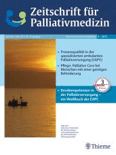
Zeitschrift fur Palliativmedizin
Scope & Guideline
Elevating the discourse in palliative medicine for better patient outcomes.
Introduction
Aims and Scopes
- Clinical Practices in Palliative Care:
The journal focuses on innovative clinical practices, emphasizing evidence-based interventions and therapeutic approaches that enhance symptom management and improve the quality of life for patients. - Ethical and Moral Considerations:
A significant aim is to explore the ethical dilemmas associated with end-of-life care, including assisted suicide, decision-making processes, and the moral implications of various treatment options. - Interdisciplinary Collaboration:
The journal promotes the importance of collaboration among healthcare professionals from various fields, including medicine, nursing, social work, and psychology, to provide comprehensive palliative care. - Patient and Family-Centered Care:
There is a consistent emphasis on the needs, preferences, and experiences of both patients and their families, aiming to develop strategies that support their emotional and psychological well-being. - Research and Education:
The journal serves as a platform for disseminating research findings and educational resources that inform best practices in palliative care, aiming to enhance the knowledge base in this evolving field.
Trending and Emerging
- Telemedicine in Palliative Care:
The rise of telemedicine as a viable option for delivering palliative care has gained significant attention, especially following the COVID-19 pandemic, highlighting its potential to improve access and continuity of care. - Focus on Vulnerable Populations:
There is an increasing emphasis on the unique needs of vulnerable populations, such as prisoners and individuals with migration backgrounds, reflecting a growing awareness of disparities in palliative care access and quality. - Integration of Mental Health Support:
Emerging themes include the integration of mental health support within palliative care, recognizing the importance of addressing psychological and emotional needs alongside physical symptoms. - Spiritual Care and Existential Support:
An expanding focus on spiritual care and existential support indicates a shift towards addressing the holistic needs of patients, encompassing emotional, spiritual, and cultural dimensions of care. - Research on Assisted Suicide and Euthanasia:
An increase in discussions surrounding assisted suicide and euthanasia reflects ongoing societal debates and the need for clear ethical guidelines and frameworks within palliative care settings.
Declining or Waning
- Traditional Approaches to Palliative Care:
There is a noticeable decline in publications focusing on conventional models of palliative care, suggesting a shift towards more innovative and integrated approaches that prioritize holistic and patient-centered care. - Historical Perspectives on Palliative Medicine:
The journal has seen fewer papers discussing the historical development of palliative care, indicating a movement away from retrospective analyses towards more contemporary issues and challenges in the field. - Basic Symptom Management Techniques:
While still important, the frequency of publications centered on basic symptom management techniques has decreased, possibly due to the increasing complexity and specialization of care models.
Similar Journals
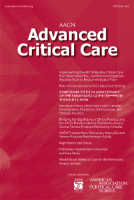
AACN Advanced Critical Care
Elevating clinical practice with cutting-edge insights.AACN Advanced Critical Care, published by the American Association of Critical-Care Nurses, serves as an essential resource in the field of critical care nursing and emergency medicine. With an ISSN of 1559-7768 and an E-ISSN of 1559-7776, this peer-reviewed journal is committed to advancing the knowledge and practice of critical care through rigorous research and innovative clinical insights. The journal holds a reputable position within its field, achieving a Q2 ranking in Critical Care Nursing and Emergency Medicine, alongside a Q3 ranking in miscellaneous Medicine categories for 2023. With a convergence of scholarly contributions from 2006 to 2024, it strives to explore the latest advancements and challenges in critical care environments, ensuring that its readership of researchers, healthcare professionals, and students are well-informed of emerging trends and best practices. The journal does not offer Open Access, however, its impact and relevance are evident from its Scopus rankings, which place it at a commendable #14 in Critical Care Nursing and #47 in Emergency Medicine. As a crucial platform for knowledge dissemination, AACN Advanced Critical Care plays a vital role in enhancing clinical effectiveness and improving patient outcomes in acutely ill populations.

Medycyna Paliatywna-Palliative Medicine
Elevating Standards in Palliative Medicine ResearchMedycyna Paliatywna-Palliative Medicine is a vital academic journal dedicated to advancing the field of palliative care, published by TERMEDIA PUBLISHING HOUSE LTD. With its ISSN 2081-0016 and E-ISSN 2081-2833, this journal serves as a reputable source of high-quality research and compelling insights for scholars, healthcare professionals, and students committed to improving the quality of life for patients with serious illnesses. Although it does not currently offer Open Access, Medycyna Paliatywna ensures that articles published within its pages undergo rigorous peer review, reflecting the highest standards in medical research. The journal aims to contribute to the ongoing dialogue in palliative medicine, encouraging innovative practices, sharing evidence-based strategies, and fostering collaboration among healthcare providers. By disseminating important findings and clinical insights, Medycyna Paliatywna plays a crucial role in shaping the future direction of palliative care, making it an essential resource for anyone involved in this critical field.

SUPPORTIVE CARE IN CANCER
Shaping the future of oncology care and rehabilitation.SUPPORTIVE CARE IN CANCER is a premier academic journal published by Springer, dedicated to advancing the understanding and management of supportive care for cancer patients. With a notable impact factor, the journal is recognized for its contribution to the fields of Oncology, Rehabilitation, and Nursing, achieving impressive rankings in Scopus, including Q1 for Oncology Nursing and Rehabilitation, and Q2 for general Oncology. Founded in 1993 and looking towards a promising future until 2024, it serves as a vital resource for researchers, professionals, and students engaged in these critical areas of healthcare. Although not an Open Access journal, its rigorous peer-reviewed articles provide valuable insights into innovative practices and evidence-based strategies that enhance patient quality of life during and after treatment. By bridging the gap between research and clinical practice, SUPPORTIVE CARE IN CANCER significantly influences patient outcomes and fosters interdisciplinary collaboration in patient support.
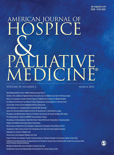
American Journal of Hospice & Palliative Medicine
Elevating the standards of end-of-life care through research and innovation.The American Journal of Hospice & Palliative Medicine, published by SAGE Publications Inc, is a leading peer-reviewed journal dedicated to advancing the field of hospice and palliative medicine. With its ISSN 1049-9091 and E-ISSN 1938-2715, the journal has been a vital resource since its inception in 1984, aiming to provide comprehensive insights into clinical practices, innovations, and research findings that enrich the quality of life for patients with serious illnesses. It holds a prestigious position as a Q2 journal in the field of medicine (miscellaneous), ranked #139 out of 636 in General Medicine with an impressive 78th percentile standing according to Scopus. The journal does not currently operate under an Open Access model, ensuring rigorous review and quality control of its content. Researchers, clinicians, and students are encouraged to engage with the latest developments and evidence-based practices in palliative care as the journal continues to shape discussions and policies in this critical area of healthcare.

THEORETICAL MEDICINE AND BIOETHICS
Pioneering Research at the Crossroads of Ethics and Medicine.THEORETICAL MEDICINE AND BIOETHICS, published by SPRINGER, is an esteemed journal dedicated to exploring the complex intersections of medicine, ethics, and law. With its ISSN 1386-7415 and E-ISSN 1573-1200, this journal serves as a vital platform for scholars, practitioners, and students interested in the ethical implications of medical practices and innovations. Although it currently holds a Q4 impact factor in the categories of Issues, Ethics and Legal Aspects and Medicine (Miscellaneous) as of 2023, its relevance is amplified by its commitment to fostering critical discourse in a rapidly evolving field. The journal features a diverse range of articles that address profound ethical dilemmas in healthcare, making it a significant resource for contemporary research from 1997 to the present. As an open-access journal, it ensures that cutting-edge knowledge is readily available, inviting contributions that challenge conventional thought and advance the field of bioethics.
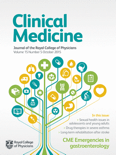
CLINICAL MEDICINE
Innovating medical practice with cutting-edge insights.CLINICAL MEDICINE is a distinguished academic journal dedicated to advancing the field of medicine, published by the Royal College of Physicians of London. Operating since 1973, it has established itself as a critical platform for disseminating innovative research and insights in the realm of clinical practice. With an impressive impact factor positioning it in the Q2 category within the broad spectrum of Medicine (miscellaneous) and ranking 56th out of 636 in General Medicine according to Scopus, the journal is a vital resource for researchers, practitioners, and students alike. CLINICAL MEDICINE provides open access options, ensuring that its findings are widely accessible to the global medical community, fostering collaboration and knowledge sharing. As the field of medicine continues to evolve, this journal remains committed to enhancing clinical practices through rigorous research, critical reviews, and comprehensive articles that examine contemporary challenges and breakthroughs in medicine.
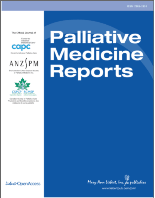
Palliative Medicine Reports
Bridging knowledge and practice in palliative medicine.Palliative Medicine Reports, published by MARY ANN LIEBERT, INC, is an esteemed Open Access journal dedicated to advancing the field of palliative care and pain management. Since its inception in 2020, this journal has established itself as an important platform for researchers and practitioners in the domains of Advanced and Specialized Nursing, Anesthesiology, and Pain Medicine. With an impressive Q2 ranking in both Advanced and Specialized Nursing and Anesthesiology and Pain Medicine, and a Q3 ranking in the Health (Social Science) category, it stands out as a reputable resource for disseminating high-quality research. The journal fosters an interdisciplinary approach, aiming to bridge gaps in knowledge and practice related to palliative care and the holistic needs of patients experiencing serious illness. Researchers, clinicians, and scholars are encouraged to contribute their work, benefitting from the journal's broad visibility and rigorously peer-reviewed process, ensuring that critical advancements in the field receive the attention they deserve.
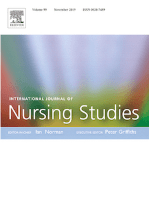
INTERNATIONAL JOURNAL OF NURSING STUDIES
Transforming patient care with groundbreaking research.INTERNATIONAL JOURNAL OF NURSING STUDIES, published by PERGAMON-ELSEVIER SCIENCE LTD, stands as a leading journal in the field of nursing, holding a remarkable impact in the academic community with its prestigious Q1 ranking in Nursing (miscellaneous) and a commendable position in the 99th percentile of General Nursing according to Scopus rankings. Since its inception in 1963, the journal has consistently aimed to foster the dissemination of significant research, innovative practices, and comprehensive reviews relevant to nursing and healthcare disciplines. With a commitment to high-quality, peer-reviewed content, it serves as an invaluable resource for researchers, healthcare professionals, and students alike, seeking to advance knowledge and improve patient care outcomes. While it is not an open-access journal, the impactful research published within its pages is vital for the development of nursing science globally, making it a cornerstone of current nursing scholarship.

THERAPEUTISCHE UMSCHAU
Transforming Healthcare through Scientific Exploration.THERAPEUTISCHE UMSCHAU, published by HOGREFE AG in Switzerland, serves as a vital resource for researchers and professionals in the field of medicine. With an ISSN of 0040-5930 and E-ISSN 1664-2864, this journal has been a credible platform for scientific discourse since its inception in 1947. It is currently ranked in the Q4 category in Medicine (miscellaneous) and holds a position of #462 out of 636 in the Scopus rankings for General Medicine, placing it in the 27th percentile. Although it does not offer open access, the journal presents a wealth of articles that cover diverse therapeutic methods and advancements, catering to a broad audience from seasoned practitioners to emerging scholars. As it converges towards the year 2024, THERAPEUTISCHE UMSCHAU continues to emphasize the importance of innovative research in clinical efficacy and healthcare practices, reflecting its ongoing commitment to advancing medical knowledge and patient care.
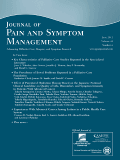
JOURNAL OF PAIN AND SYMPTOM MANAGEMENT
Navigating the Complexities of Pain Management TogetherThe Journal of Pain and Symptom Management, published by Elsevier Science Inc, stands as a seminal platform in the fields of Anesthesiology, Pain Medicine, Neurology, and Nursing since its inception in 1986. With an impressive Q1 ranking in multiple categories, this journal is recognized for its rigorous peer-reviewed articles and high-impact research, evidenced by its rankings in the 93rd percentile in Medicine - Anesthesiology and Pain Medicine, and the 97th percentile in Nursing. The journal aims to advance the understanding and management of pain and associated symptoms through innovative research, clinical practice guidelines, and systematic reviews. Researchers and professionals alike benefit from its commitment to disseminating cutting-edge findings that address the complexities of pain management and improve patient care. The journal is accessible in print and electronically, ensuring a broad reach within the academic community.